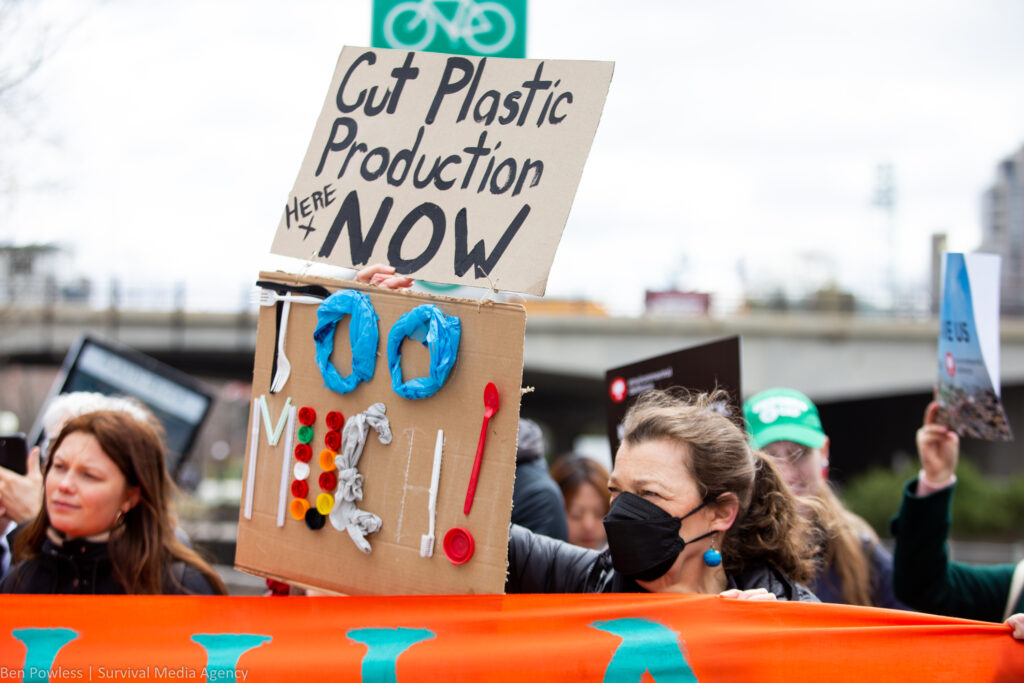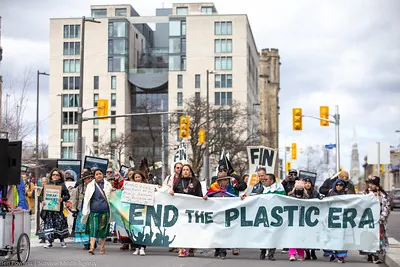|
Getting your Trinity Audio player ready...
|

Two weeks ago, the Trump administration signed an executive order reversing the federal government’s move away from single-use plastics. The focus, as it often has been, was on the debate over plastic straws. Ironically, straws have sort of become the strawman in what should be a broader and more critical discussion about plastic production and its devastating impacts. For many people, plastic straws became a symbol of the world’s plastic pollution crisis, while on the right, it was reduced to a running political joke that helped politicians on that side of the political spectrum score cheap points.
While there are legitimate criticisms of plastic straw bans, including the fact that plastic straws are an accessibility tool for many disabled people, Trump’s executive order was not done with an eye towards accessibility. This executive order, at the heart of it, is yet another BIG GIVEAWAY to corporate polluters at the price of some very real, harmful consequences for American communities.
Obviously, single use plastic items don’t come out of nowhere. From production to use, plastics are toxic, polluting and dangerous.
It starts with drilling, often located near schools and homes at an inadequate distance that science shows isn’t safe for public health. Once an oil or gas well is drilled, it becomes a forever pollution problem. It is often the case that after a company is finished drilling or fracking they walk away from it, abandoning and orphaning wells to be left to taxpayers to cleanup.
From wells come pipelines and more industrial facilities to support extraction and transportation of fossil fuels. This infrastructure is disproportionately located near Black, Hispanic, low income, and rural communities. Finally the fracked gas arrives at petrochemical facilities across the United States where the building blocks of plastics are made.
There are already more than 200 petrochemical and plastics production facilities in the U.S. The majority of them are located in Texas, Louisiana and Appalachia. Even though the market for new, virgin plastics is overbuilt, with demand not meeting the supply, Big Oil continues to push to expand its footprint. This is where Trump’s most recent executive order is a giveaway.
In Pennsylvania, for example, when Shell Energy’s plastic plant in Beaver County Pennsylvania started operations in 2022 the market for virgin plastic was already overbuilt – growing 60% since 2017. This facility was supposed to kick start Appalachia’s petrochemical renaissance. But the Beaver County plant was the only one built and, even, it is highly unlikely to meet its financial targets. Instead of a boom in the local economy that was promised, communities have experienced increased risk of harm.
That’s because these heavy industrial facilities are dangerous. Plastic and petrochemical facilities across the United States have had 228 incidents since 2023 with just 8 days since the last incident. They don’t just emit toxins and carcinogens during accidents but rather are permitted to emit pollutants such as benzene, a known cancer-causing chemical, into the air and water as part of normal operations. They also bring excess and unnatural light and noise which can impact quality of life and harm to human and animal health. Data continues to show that living on the fenceline of these facilities are at higher risks of cancer, adverse birth outcomes, respiratory disease, and kidney disease.

So, yet again, the Trump administration makes clear whose side it’s on, that of those poisoning and harming the American people and not those protecting them. More single use-plastics neither acknowledges the economic reality of a world turning away from them nor matches the desire of the American people facing the biggest impacts to plastics production. Demanding the federal government, again, spend taxpayer money to subsidize single-use plastics is just putting more money into the already deep pockets of big oil and gas and, consequently, a doubling back down on polluting people and climate catastrophe.
